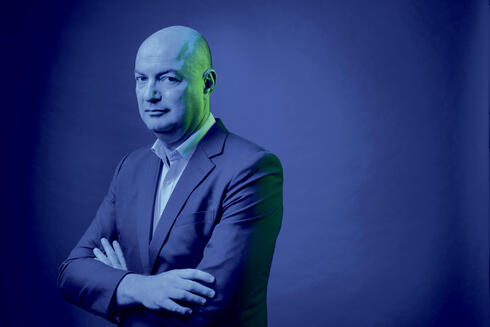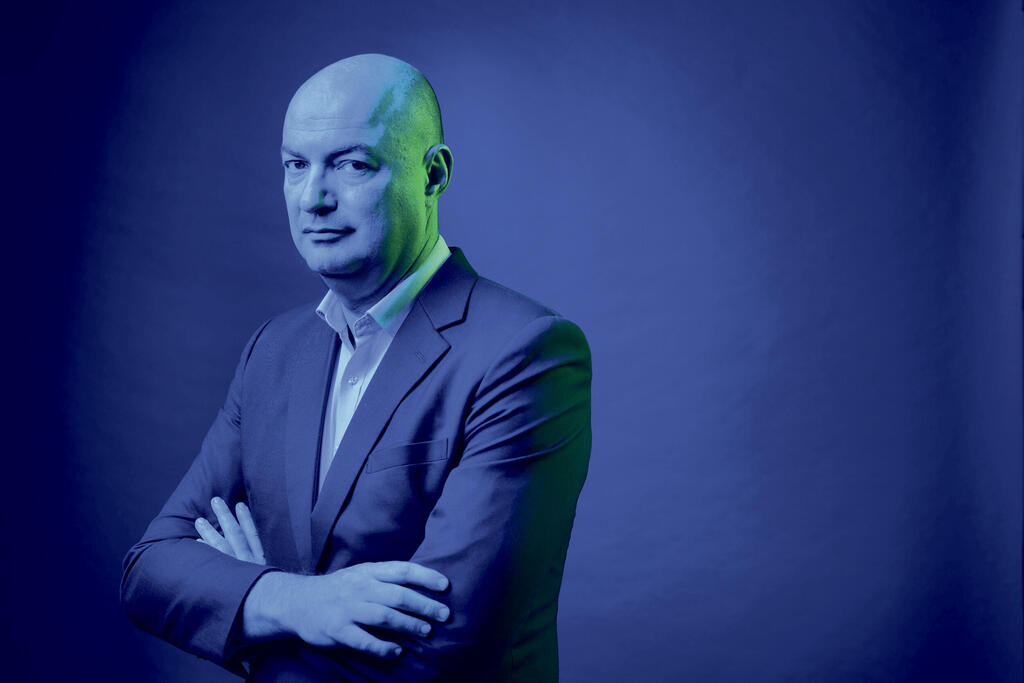
Interview
"Innovation is a synonym for democracy. Freedom in Israel is essential for the success of high-tech"
Yigal Unna was the head of a division in the Shin Bet (Israel Security Agency), and later the country's top cyber defender as the head of the National Cyber Directorate. He left for the private market a year ago, and since then has been involved in countless ventures and establishing defense systems in foreign countries. Now, for the first time after decades in public service, he has also become a protester against the government and his former boss. But, despite the threats, he remains optimistic
"Democracy is in our soul, that's why people take to the streets. Civil society will win in the end," says Yigal Unna, who until a year ago was Israel's most senior cyber defender as the head of the Israel National Cyber Directorate, a body that parallels the Mossad and the Shin Bet in its direct reporting to the Prime Minister's Office. “We don’t want to be in a legal system like that of Singapore, but live in a free country. The degrees of freedom in Israel are one of the main reasons for our success in high-tech. Israeliness rewards success. This is very different from the Indian, Chinese and Japanese culture, which are more motivated by the fear of failure. This is a fundamental difference. Innovation is a synonym for democracy."
Unna (52) was a civil servant for more than 30 years. He started his career as a captain in Unit 8200, and when he was released, he moved to the Shin Bet (Security Agency), where he was responsible for the Signet department, the traditional name for gathering intelligence from communication networks, which later became part of the cyber world, and he advanced up to the rank of head of department. In 2018, he retired from the Shin Bet in favor of establishing the National Cyber Directorate, which he managed until his retirement last year. Now, when for the first time since the 1980s Unna is not a soldier or a civil servant, he finds himself protesting, to save democracy.
In response to the recently popular question, "Where were you during the disengagement? It was Unna and his Shin Bet team that were responsible for monitoring Bezalel Smotrich, then a "target" of the Jewish Department and today the Minister of Finance of the State of Israel. This is not a trivial event for Unna, who grew up in the heart of religious Zionism in the settlement of Ma'ale Michmash, and until his enlistment maintained a religious lifestyle ("When you start coming home once every few weeks, it's harder to get up to go to synagogue on Shabbat morning," he says with a smile).
The situation is getting more extreme, people you followed in the Shin Bet are now becoming cabinet members. What do you think will happen on the day when the Shin Bet will have to decide whether to obey the government or the court?
"An official in the system obeys the law, and the court represents the law. You can like it or not, but it is the basis of this whole business. By the way, during the disengagement, I felt the pain of the protestors and demonstrators, I have no ideological problem with them. My problem with them today is that they are completely disregarding the other side. I also don't think there is any malicious intent on the part of anyone, it's simply their messianic worldview."
If there is no malicious intent, why did former Shin Bet officers publish an ad in support of the current Shin Bet chief Ronen Bar?
"I know and appreciate Ronen on a professional and social level, and know that he is not the Netanyahu family's cup of tea. And note that I said 'family'. Once you do not approve security for them you are out. Nadav Argaman, his predecessor in the position, knew how to evade these landmines, and Ronen walked right through them."
Don’t shoot yourself in the foot
The long and frank conversation with Unna is characterized by ambivalence. Now that he is no longer in the Shin Bet, and for the first time in his life not in the civil service either, he sees the Israeli reality through new glasses, those of a businessman.
Since his retirement from the Cyber Directorate, Unna has become one of the most sought after people in the industry. Today he is involved as a director or consultant in no less than 12 startups, including SyMania, which developed identification solutions using colored symbols, and the cyber company Security Matters from Kibbutz Naan, which recently began trading on Nasdaq at a value of $360 million. "I wanted to work with young entrepreneurs," he says. "I owe it to my soul, not my pocket."
And if he speaks decisively and bluntly about the political and social consequences of the legal reform, then in the business arena, in his view, there is no drama. At least for now. "Demand for Israeli cyber has not only not decreased, but it continues to grow. What happens in Israel is of no interest to anyone outside, after all, investors invest in Singapore, Dubai, Abu Dhabi and even Saudi Arabia - place in which there is no trace of judicial independence. So this principle is not really of interest to foreign investors. They just want their money to work and provide a return.
"What worries them now is what is happening from the inside: they ask me why the Israelis are harming themselves? Why do they tell us 'don't come to invest'? The high-tech protest sends them a message that something strange is going on here."
Are you angry about the high-tech protest?
"It's great that they want to be involved. Many of my friends, who never dreamed of going to a protest, walk with the flag every Saturday night. The high-tech protest is legitimate and excellent, because protests are not just reserved for the Histadrut (General Organization of Workers in Israel). But you have to be careful of making irresponsible statements and actions that create reality. I don't like people shooting themselves in the foot. Want to take your money out of the country? Take it out. It’s perfectly legitimate. The problem is that if you pump it up, you produce a side effect that does not affect you directly, but harms Israeli society. People who don't want to pay taxes here anymore are like a relocation for me. You have to fight for what you believe in from here, otherwise it will create long-term damage. The high-tech protest is starting to seep out and the investors are saying - wait, so your high-tech is political? Entrepreneurs have other considerations?"
You are actually saying that the worst case scenario is that we become Singapore, we become rich and successful, but without freedom. At the time, former Prime Minister Naftali Bennett did set Singapore as a role model for Israel.
"God forbid. We need to separate the judicial coup from the economy, because the processes happening here are very dangerous. It's not in our DNA that one side disregards the other side. Now it is popular to compare the situation to the disengagement, but then there was a protest and yes it was not ignored. Now the protest is being disregarded. When one side has a majority, it actually obliges them more to consider the other side. This is what I am protesting, the question of how the rules of the game are determined in a democratic country. So no, we don't want to and we can't become Singapore either, because we have a different situation here.
"I know Singapore because I advise their government and this requires me to respect their legal system, the law and their culture. But we will not be like them because of the geographical environment. We must have sources of growth and we must not damage the ecosystem that makes it possible. An ecosystem is academia, the army, the national character, nature. It's all together. They call it nice words like 'innovation' and 'entrepreneurship', but it's more than that."
Let's talk about what's happening on the ground. You are the chairman of the INNOTECH 2023 conference, one of the largest cyber events in Israel. Is there interest from investors and governments?
"There is tremendous interest. We really like to beat ourselves up, just like the Shiites, but there are two things that have not changed: the rate of release of soldiers from the technology units and the existence of the Israeli genius. All of this only works from here, and therefore Israeli high-tech will continue to advance. Look at everyone who returned to Israel from Silicon Valley during the Corona period. For example, Nir Zuk, the founder of Palo Alto Networks with whom I meet a lot. He had a great career in the United States, and when I asked him, 'Why did you even return?', he answered that when there are no real friends and no real community, there is no one with whom to brainstorm."
So you're not afraid of a relocation epidemic?
"I am sure that there is a commotion and an increase in relocation, which already started with the change in the economic situation in the world, because it is difficult to raise money here and living abroad is cheaper. But is high-tech being depleted? No, and if it is depleted - it will grow again. After all, it never grow thanks to the government - which did nothing for high-tech to flourish, at best it did not interfere."
Still, it is a bit simplistic to try to separate the things, especially when we see that since the beginning of the year very few new startups were registered in Israel and the investment tap has been almost completely closed.
"Those who have trouble raising money find it convenient to blame the situation. The rising interest rates has been killing us all for six months, and the investors' mood is not encouraging them to put their hands in their pockets. This is the problem, and some are taking advantage of it. Not a single serious investor wants his money to be wiped out. I meet a lot of people now, and that's what interests them. The thought of the money being locked up here scares them, but it isn't happening and won't happen. Whoever is a real investor and not a casual one, you'll find their money in Saudi Arabia too, and they invest there with love. In Singapore, there are executions and that doesn't bother anyone. We need to take care of communication, consensus, rules of the game, but that needs to be separated from the business."
To what extent do the statements of the cyber employees that they will not report to reserve duty threaten Israel's security?
"The IDF should be taken out of any debate completely," Unna says, and for the first time loses some of his composure. "We all know that at the moment of truth, if a war starts - everyone will stand up. So why touch something that is sacred to all of us? Why go out and scream and shout about it? It will come back and hit us like a boomerang. What's more, at the level of cyber threats there is really no threat, because the shelf life of cyber fighters is much more limited than pilots. Any 18-year-old who enlists now knows the layers and subtleties much better than his commander. That's why I even laugh at these threats."
That sounds relatively calming, which is surprising in light of what we heard from former Shin Bet chief Nadav Argman, who said that Netanyahu is "running into the abyss", and Zeev Snir, who was the head of the Atomic Energy Commission, who wrote that "Israel is going to be a third world country". How do you explain this gap?
"I thought about it after I heard them. I don't agree with them completely, but I don't think they're grossly wrong either. I'm simply more optimistic than they are. Maybe because of this optimism I didn't become the head of the Shin Bet," he laughs. "I am not blind to what is happening, on the contrary. But my optimism stems from the fact that we have a strong legacy of a vibrant and vigilant civil society, which you now see demonstrating in the streets. This indicates that in Israel the government is allowed to manage up to a certain level, and when it crosses the lines and exaggerates like changing civil freedom, it is stopped."
Sarah's hair salon secret
Unna is also a partner in the venture capital fund Windare, which he founded together with Major General (ret.) Amos Malka, who was the head of the IDF's Military Intelligence Directorate during Unna’s time in the Shin Bet, and also advises governments on the establishment of cyber systems. "From here I'm flying to Africa," he says without elaborating on a secret project in an unknown country, while sipping a milkshake. "Images are for the weak," he says and laughs, when I ask him what the customers in Africa would think of his drinking preferences.
Israeli cyber's image has been tarnished in recent years because of the NSO affair, whose Pegasus spyware was used in the mobile phones of journalists, human rights activists, and civil servants around the world. Does it cloud the business?
"Israel's brand is very strong. Since I moved to the private sector, I see how significant the scope of Israeli cyber activity is, and how when customers hear that the product is Israeli, their attitude becomes more respectable and respectful.
"On the national level, I feel sorry for NSO, it's a company that has done good to the world," Unna surprisingly says. "There is a need in the world for cyber collection tools and it is better that a country like Israel provides them and not Russia, for example, because we have a moral compass. The problem begins when there is insufficient supervision. After NSO began to explode and sell rapidly, its supervision system was not good, and it needs to be better. You need supervision by a board of directors and more checks and balances. The second problem is image. If you want to engage in this field, you need to look as clean and tidy as possible, and not like a Mexican cartel. NSO should have regulated the customers, and instead did everything with a kind of wink. When it woke up, it was already too late."
What is the hottest thing in the cyber market today?
"Artificial intelligence and its abuse, for example to find loopholes in software. ChatGPT opened everyone's eyes - it's not a new technology, but now it's accessible to everyone. Up until now, hackers have found loopholes manually, so everything worked more slowly, now AI can do the job, and quickly. The second threat in artificial intelligence lies in its ability to imitate human behavior at a high level, and this will be felt mainly in more sophisticated phishing attacks."
Are there already defensive capabilities against these threats?
"I receive several presentations a day from startups, and they always mention artificial intelligence, but very few of them deal with the hardcore of the field. The Israeli market must respond to this quickly, because we are strong at the global level in AI as well, and this can be a tremendous growth engine."
What are Israel's most critical infrastructures today? Are attacks on Twitter more frightening than an attack on water reservoirs or power grids?
"It is possible to understand where Israel's water borders are in order to protect them, but how do you protect democracy? To be successful, you need to know where the weak points are as the enemy analyzes them. It is no longer so much cyber and more psychology. The most difficult days in my career in the Cyber Directorate were in the days of the elections in Israel. In all of them there were dramatic attempts to influence the results of the elections. We identified everything and were able to stop them, but the most critical infrastructure that needs defending today is democracy."
First published: 15:44, 30.03.23















